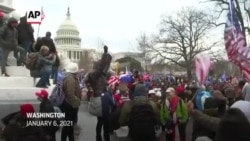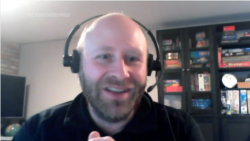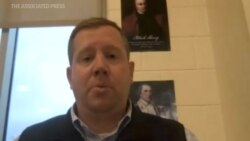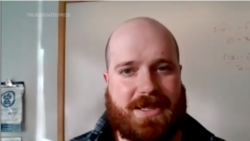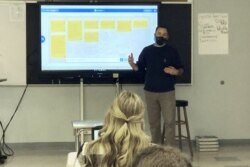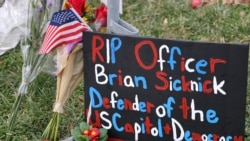Social studies teachers across the United States are changing their plans for lessons this week. They want to help young people make sense of the news about the violence in Washington.
Fighting apathy about politics
Karley Reising is a social studies teacher at Robert E. Fitch High School in Groton, Connecticut. "In almost every single one of my classes, the students brought it up before I even could," she said. And she added, "…my seniors were really struggling with what this meant about the future of our country in a way that was pretty heartbreaking."
Reising and others said they talked about the importance of being involved with the process of government. They wanted to lead students away from the idea that there must be violence to end a political fight.
Michael Neagle teaches at Lowell High School in Massachusetts. After finishing his class on Thursday, January 7, he said it was one of the most important days he had as a teacher. He wants his students to be active in civic life. "We don't want kids to tune out and just say, 'Well, this is how it is. Nobody gets along. Politics.' That voter apathy is so dangerous," he said.
Teaching with morning newspapers
South St. Paul, Minnesota, teacher Mark Westpfahl showed the morning newspapers to his sixth-grade students learning online. His school is near the place where George Floyd died. His students asked questions about the police response that will carry into later lessons. He planned to talk in future classes about how the two events can be compared to each other. "What was the response like? What was the media presence like?" he said.
Parents are watching
As Westpfahl taught his 10- and 11-year-old students on a video conference, three or four parents appeared without speaking. He wondered about their thoughts.
Many teachers working online record their lessons so parents can study them with their students at home. One Washington, D.C. area teacher heard that some of her students had parents in the National Guard group working at the Capitol on Wednesday. This made her think carefully about the feelings of her students and their parents.
In Alabama, 10th grade teacher Blake Busbin said he, too, thought about how students and the community would respond to his actions and words. He said he chooses his words very carefully.
Busbin is a teacher at Auburn High School. He made a point to let students watch the unrest on TV. He was a high school senior on September 11, 2001 when terrorists attacked the United States with hijacked passenger jets. At that time, the school chief did not permit television in school. Busbin felt he lost an opportunity to watch history in the making.
Careful thought and writing
The day after the attack on the U.S. Capitol, he woke early and gathered 25 photographs. He showed each one for 10 to 15 seconds without saying anything, then asked students to write poems. He wanted students to first think quietly about what happened.
The students did not write their names on the poems, and they did not read them in class. Busbin said they helped him understand students' thoughts and guide his future teaching. The poems, he said, show a desire for a more harmonious government, a more cooperative approach and a belief that things can get better.
In David McMullen's classroom at Great Path Academy in Manchester, Connecticut, students argued about the identity of the attackers.
He asked his students to write their thoughts about the event for future historians. "I tell my students, they are the future's primary sources," he said.
Hopeful note for involvement
Teachers usually stay away from voicing their opinions, or if they do talk about them, identify them as their own opinions.
Reising said the conversation among her students was difficult because many have never met face to face. She tried, however, to end the discussion on a hopeful note. As young adults, she sees her students as citizens who can be active in government without using violence.
Conor Murphy teaches at West Genesee High School in Camillus, New York. He remembered the 9/11 attacks, when he was in an American history class and watched the second plane hit the World Trade Center in New York.
He said it was important to help students understand the historical importance of such an event. A year ago, he had a similar job teaching participation in government during President Donald Trump's impeachment trial in Congress.
"But," he said, "I've never really had to teach anything quite so, in my opinion, profound."
I’m Jill Robbins.
Michael Melia and Carolyn Thompson wrote this story for the Associated Press. Jill Robbins adapted it for Learning English. Mario Ritter, Jr. was the editor.
_____________________________________________________________________________
Words in This Story
kids – n. young people or children
tune out – phrasal verb. to stop caring
apathy – n. the state of not caring about something
response – n. something that is done as a reaction to something else
make a point –v. to place importance on something so it receives attention
harmonious –adj. not experiencing disagreement or fighting
primary source – n. a document or story created at the time of an historic event
participation –n. being involved with others in doing something
profound – adj. difficult to understand or requiring deep thought or wisdom
How do you think teachers should lead discussion of the insurrection? We want to hear from you. Write to us in the Comments Section.
For Teachers
Common Sense Media offers these resources to help teachers talk with students about the violence at the Capitol.
The Center for Civic Education has this collection of ideas for teaching about the peaceful transition of power.
Facing History offers these teaching ideas.



